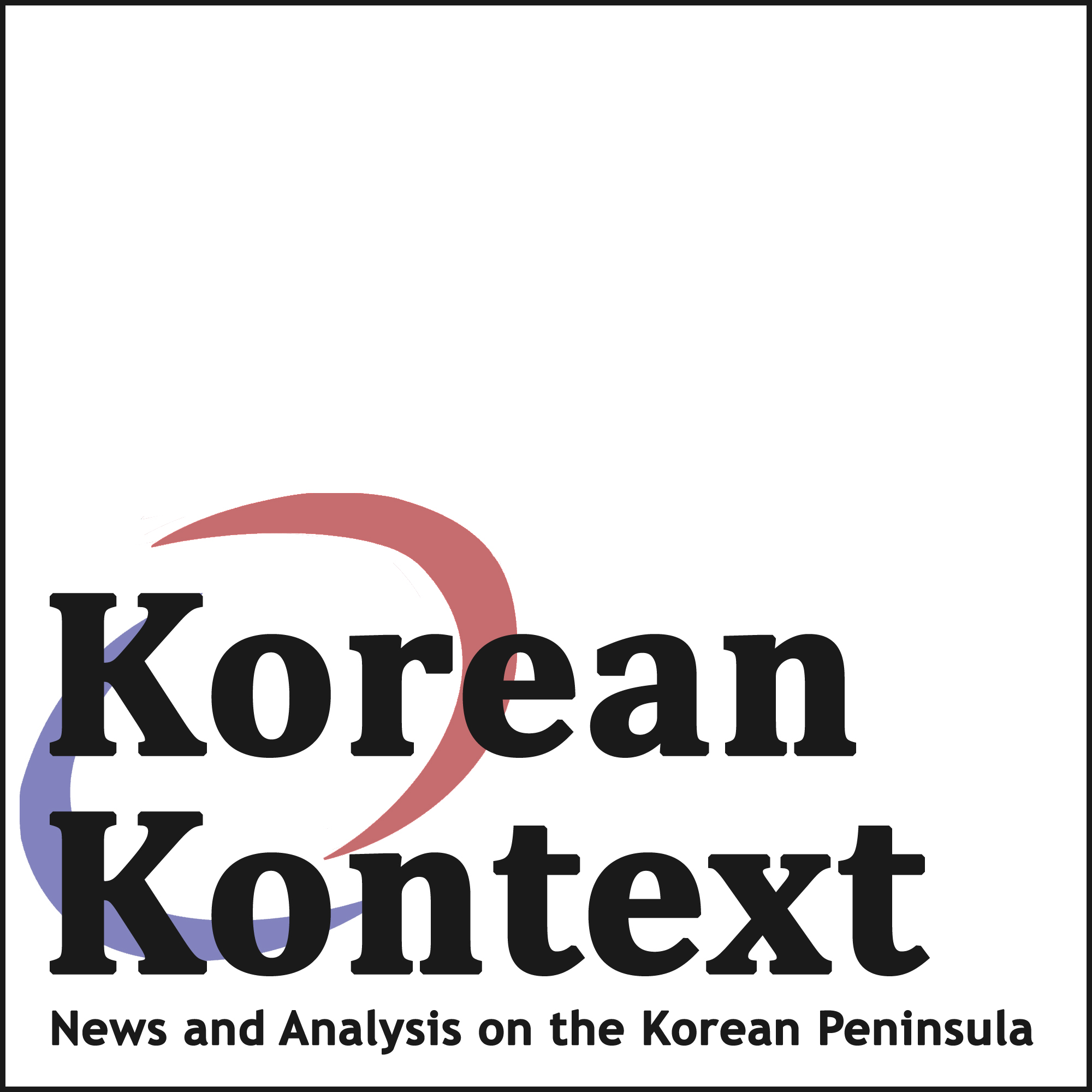Episodes
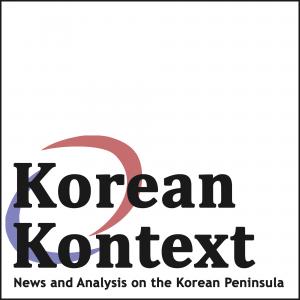
Thursday Mar 07, 2024
What are Domestic Politics Doing to the U.S.-Korea Alliance?
Thursday Mar 07, 2024
Thursday Mar 07, 2024
In April 2023, the United States and South Korea marked the 70th anniversary of an alliance that has served the strategic interests of both countries. Their relationship has expanded beyond security issues to include trade, technology, and other important policy areas. However, the alliance now faces challenges from changing notions of national interests and political polarization in both countries.
On January 16, 2024, KEI hosted a discussion with Scott Snyder, author of The U.S.-Korea Alliance: Why It May Fail and Why It Must Not, on what domestic political developments in both countries mean for the future of the U.S.-Korea alliance.

Thursday Feb 29, 2024
Charting China’s Use of Armed Coercion: James Siebens (Part 2)
Thursday Feb 29, 2024
Thursday Feb 29, 2024
Building on last year’s "Rethinking Korea initiative," in 2024 KEI will continue to explore the evolution of US-Korea relations, Korea's place in the world, rapid changes in Korean society, and a fast changing geopolitical and strategic landscape. The initiative involves both retrospective inquiry as well as prospective analysis about future trends. Our guest today is intently focused on the role of armed coercion as a tool of foreign policy employed by both the United States and China and how other states perceive and respond to it.
James A. Siebens is a Fellow with Stimson Center’s Reimagining US Grand Strategy program, where he leads the Defense Strategy and Planning project. His research focuses on grand strategy, military coercion, and gray zone conflict. Building on a co-edited volume titled, Military Coercion and U.S. Foreign Policy: The Use of Force Short of War (Routledge 2020), a book on U.S. strategy and military operations since the end of the Cold War, James is also the editor of China’s Use of Armed Coercion: To Win Without Fighting (Routledge 2023), a recently published study on China’s use of military and paramilitary forces for purposes of coercion.
The second part of our conversation focuses on the application of his analysis to the Korean Peninsula – both historically and in a more contemporary context – and James’ thoughts on what the United States has gotten right and wrong on China and some related policy recommendations.

Thursday Feb 22, 2024
Charting China’s Use of Armed Coercion: James Siebens (Part 1)
Thursday Feb 22, 2024
Thursday Feb 22, 2024
Building on last year’s "Rethinking Korea initiative," in 2024 KEI will continue to explore the evolution of US-Korea relations, Korea's place in the world, rapid changes in Korean society, and a fast changing geopolitical and strategic landscape. The initiative involves both retrospective inquiry as well as prospective analysis about future trends. Our guest today is intently focused on the role of armed coercion as a tool of foreign policy employed by both the United States and China and how other states perceive and respond to it.
James A. Siebens is a Fellow with Stimson Center’s Reimagining US Grand Strategy program, where he leads the Defense Strategy and Planning project. His research focuses on grand strategy, military coercion, and gray zone conflict. Building on a co-edited volume titled, Military Coercion and U.S. Foreign Policy: The Use of Force Short of War (Routledge 2020), a book on U.S. strategy and military operations since the end of the Cold War, James is also the editor of China’s Use of Armed Coercion: To Win Without Fighting (Routledge 2023), a recently published study on China’s use of military and paramilitary forces for purposes of coercion.
Our conversation is split into two parts, the first of which focuses on: the motivation behind his latest book project and what sets it apart from other work on China; key terms and concepts used throughout the book, such as coercion, deterrence and compellence; and the overall content and structure of the book as well as some of the representative examples of China’s use of armed coercion and whether they were effective.

Thursday Feb 15, 2024
Where are North Korea's Relations with Russia Headed?
Thursday Feb 15, 2024
Thursday Feb 15, 2024
For the first time since the end of the Cold War, North Korea has embraced relations with Russia as a key component of its foreign policy and domestic development. However, Russia’s need for North Korean artillery and weapons to conduct its war in Ukraine also create a different dynamic between the two countries than during the Cold War. This new dynamic and the unknown outcome of the war in Ukraine raise questions about the long-term viability of deepening ties between North Korea and Russia, as well as Pyongyang’s choice to deepen relations with Moscow and to a lesser extent Beijing, rather than seeking to improve relations with Washington and Seoul.
On February 8, 2024, KEI hosted a discussion on these and other issues related to the growing relationship between North Korea and Russia with long-time North Korea expert Dr. Andrei Lankov of Kookmin University.

Thursday Feb 08, 2024
The U.S.-ROK-DPRK Strategic Triangle in the Indo-Pacific Era
Thursday Feb 08, 2024
Thursday Feb 08, 2024
On August 17, 2023, KEI held a program on the U.S.-South Korea-North Korea Strategic Triangle in the Indo-Pacific Era. The program featured Scott Snyder’s work to help better understand: the evolution in perceptions of the three main actors in the U.S.-South Korea-North Korea triangle, including their respective approaches to one another and interactions with China; the main impacts of U.S.-China rivalry on their respective postures and priorities; and the future trajectory of both U.S.-South Korea-North Korea triangular relations and great power relations in the region.

Thursday Feb 01, 2024
How Can Korea and Australia Cooperate in the Indo-Pacific?
Thursday Feb 01, 2024
Thursday Feb 01, 2024
On August 30, 2023, KEI hosted a discussion with Prof. Rory Medcalf on South Korea’s Indo-Pacific Strategy and Middle Power Convergence with Australia. Over the past decade, the concept of the “Indo-Pacific” has replaced the late 20th century “Asia-Pacific” as a central frame of reference for strategy and external policy. Although the Indo-Pacific is often associated particularly with Japan and its influential prime minister the late Abe Shinzo, in fact, Australia was the first country to formally recognize the Indo-Pacific as its regional security environment. As a fellow middle power and independent-minded U.S. ally, with its own geopolitical complexities to navigate, Australia provides an illuminating example for South Korea as it operationalizes its Indo-Pacific strategy.

Thursday Jan 25, 2024
Energy Insecurity: How Resource-Poor Korea and Japan Powered Their Economies
Thursday Jan 25, 2024
Thursday Jan 25, 2024
Despite being industrial powerhouses, Korea and Japan are both resource-poor nations with limited domestic sources of energy. Powering their economies required both to develop supply chains for fossil fuels, nuclear power, and renewable energy to power their economies. However, different domestic political constraints resulted in differing approaches to achieving energy security.
On September 21, 2023, KEI hosted a discussion on Korea and Japan’s efforts to achieve energy security with Dr. Seong-ik Oh who discussed his new book, Overseas Energy Investment of Korea and Japan: How did Two East Asian Resources-Rare Industrial Giants Respond to Energy Security Challenges.

Thursday Jan 18, 2024
The Costs of War: Deepening North Korea-Russia Ties
Thursday Jan 18, 2024
Thursday Jan 18, 2024
Relations between Russia and North Korea are growing closer. Pyongyang has been publically supportive of Russia’s war in Ukraine and is reported to have supplied Moscow with millions of artillery shells. Kim Jong-un met with Vladimir Putin at Vostochny Cosmodrome and discussed deepening their military relationship and providing Russia with additional military supplies. These deepening ties also raise a series of questions related to geostrategic competition in Northeast Asia, the war in Ukraine, the future of UN sanctions, and the prospects for North Korean denuclearization.
On October 5, 2023, KEI hosted a discussion of these and other pressing questions about North Korea’s deepening ties with Russia.

Thursday Jan 11, 2024
Economic Security and U.S.-China Competition: The View From North Korea
Thursday Jan 11, 2024
Thursday Jan 11, 2024
KEI is pleased to hold a program on Economic Security and U.S.-China Competition: The View From North Korea. One country is conspicuously missing from existing discussions about the dilemmas and opportunities that U.S.-China strategic competition poses to various stakeholders in matters related to global economic security: North Korea. North Korea is an interesting piece of the puzzle because it is certainly not a key player in the regional or global economy. Quite unlike its neighboring states, North Korea’s place in global supply chains is minimal at best. Yet, North Korea remains important because it is a major player in the Northeast Asian security landscape. Any key political and economic decisions this nuclear-armed state makes in this volatile region have profound implications for the security and economy of the world. And Pyongyang’s views of U.S.-China competition and its economic and political fallout will be a central component of its near- to long-term policy calculus. North Korea’s view of the Russia factor in U.S.-China competition and the shifting global order is also of relevance.
Listen to KEI’s October 11, 2023 program with Rachel Minyoung Lee, which offers a discussion of how North Korea perceives “economic security” and U.S.-China strategic competition; how its views of U.S.-China relations and the changing global order have reshaped Pyongyang’s foreign and economic policy; and the opportunities and challenges that the geopolitics and geoeconomics of U.S.-China competition pose to Pyongyang.

Friday Jan 05, 2024
Rhetoric Vs. Reality: Seoul and Washington’s Strategic Alignment on Taiwan
Friday Jan 05, 2024
Friday Jan 05, 2024
Seoul has gradually adopted a more outspoken position regarding the importance of peace and stability in the Taiwan Strait and framed it in increasingly expansive terms—as a regional and global issue yet also directly linked to the peace and stability of the Korean Peninsula. Nevertheless, the U.S.-ROK alliance faces a gap between such rhetoric and its political, military, and operational preparedness to navigate an actual conflict between the United States and China over Taiwan and the attendant risk of a simultaneous conflict in Korea.
KEI Fellow and Director of Academic Affairs, Clint Work, sat down to discuss his recent Korea Policy paper, Rhetoric vs. Reality: Seoul & Washington’s Strategic Alignment on Taiwan, with Markus Garlauskas, director of the Indo-Pacific Security Initiative of the Scowcroft Center for Strategy and Security.

Thursday Dec 28, 2023
Korea’s Cultural Wave: The Story Behind the Strength
Thursday Dec 28, 2023
Thursday Dec 28, 2023
From K-pop to K-drama and food, Korean culture has taken the globe by storm. Korean artists are topping the Billboard charts, Korean films are winning Oscars, and Korean kimbap at Trader Joe’s went viral online. Cultural interest is also behind the growth of students learning Korean in the United States when interest in foreign languages is going down in general. What drives this interest and resonates with people across the globe? What role does Korean popular culture play as a form of soft power and cultural diplomacy in the United States? What are some aspects of Korean culture that are often misunderstood?
Join us for a conversation with Amb. Jie-ae Sohn, South Korean Ambassador for Cultural Cooperation, to learn more about the story behind Korea’s cultural wave, moderated by KEI President Ambassador Kathleen Stephens.

Thursday Dec 21, 2023
South Korea: Caught in the Crosshairs of U.S. China Competition Over Semiconductors
Thursday Dec 21, 2023
Thursday Dec 21, 2023
Countries with advanced semiconductor industries are caught in the middle of growing U.S.-China competition in technology focused on advanced computing. While some countries with key technology companies in the toolmaking sector have been drawn into the competition previously, South Korea and its national champions, Samsung and SK Hynix, have arguably incurred some of the most significant pressure. These firms have billions of dollars of sunk investment in China-based facilities and the future of these facilities remains in doubt after a series of new U.S. measures unleashed by the U.S. Commerce Department. South Korean companies are also players in other parts of the global semiconductor supply chain, including semiconductor manufacturing tools, and China remains an important market for both components and electronic devices. Each country caught in the U.S.-China technology competition faces difficult tradeoffs in determining how best to support its leading companies while navigating changing and often arbitrary U.S. decisions that have already significantly disrupted global supply chains. Finally, at the same time as U.S. export controls have impacted South Korean companies’ ability to retain business operations and market access in China, major front-end manufacturers, particularly Samsung, are also looking to expand their operations in the United States and benefit from the U.S. CHIPS Act. All of this puts South Korea in one of the more complex positions as the industry faces continued restructuring, buffeted by both export controls and industrial policies.
Please join KEI as Mr. Paul Triolo sheds a greater light on the dynamics of these challenges for both Seoul and South Korean technology players.

Thursday Dec 14, 2023
The ROK-U.S. Alliance at 70: Expanding Diplomatic Horizons Through Public Diplomacy
Thursday Dec 14, 2023
Thursday Dec 14, 2023
The United States and the Republic of Korea have been celebrating the 70th anniversary of the alliance and the 120th anniversary of Korean immigration to the United States throughout 2023. Along with our military and economic partnership, people-to-people ties have served as a central pillar of our multifaceted relationship. Both those who have practiced diplomacy and ordinary people through their personal and professional connections have contributed to the close and ever deepening relationship our two countries enjoy today. Please hear from current and former Ambassadors about how public diplomacy has expanded the diplomatic horizons of our alliance and how it will help the two countries and their people achieve a secure and prosperous future.

Thursday Dec 07, 2023
What We Know and Don’t Know about North Korea
Thursday Dec 07, 2023
Thursday Dec 07, 2023
The recent war in Ukraine, Russia’s overtures towards North Korea, and North Korea’s emergence from the COVID-19 pandemic all signal a sea-change for the DPRK’s place in the international system.
KEI Economic Policy Analyst Tom Ramage sat down with SOAS University of London professor and North Korea expert Hazel Smith to discuss the recent Putin-Kim summit, alleged North Korean munitions to Russia, the effect of sanctions on North Korean denuclearization, and the priorities they will all take within Washington and Seoul’s responses to increasing conflicts abroad.

Thursday Oct 26, 2023
From K-Pop to K-Beauty: KEI at KCON
Thursday Oct 26, 2023
Thursday Oct 26, 2023
In 2023, KEI has set out on its "Rethinking Korea initiative," which explores the evolution of U.S.-Korea relations, Korea's place in the world, and rapid changes in Korean society itself. The initiative involves both retrospective inquiry as well as prospective analysis about future trends. Today, we will be discussing the growing popularity of K-pop and K-culture within the United States.
KEI’s Director of Communications, Sang Kim, and Operations Manager, Mai Anna Pressley, attended KCON LA in August, and shared their experiences and observations while at the convention. KCON is an annual convention held globally, organized by CJ E&M as a celebration of the Korean Wave. In addition to their conversation, snippets of interviews with convention attendees are included throughout the podcast.

Thursday Oct 12, 2023
South Korea and Global Public Health Beyond the Pandemic: Dr. Jerome Kim
Thursday Oct 12, 2023
Thursday Oct 12, 2023
In 2023, KEI has set out on its "Rethinking Korea initiative," which explores the evolution of U.S.-Korea relations, Korea's place in the world, and rapid changes in Korean society itself. The initiative involves both retrospective inquiry as well as prospective analysis about future trends. As part of this initiative, KEI looks to build upon its previous programs and publications and deepen understanding of the key issues they explore. Today’s two guests help us do so.
Dr. Jerome Kim, is the Director General of the International Vaccine Institute (IVI), based in South Korea, and an international expert on the development and evaluation of vaccines. Interviewing Dr. Kim is Salome Da Silva Duarte Lepez, a researcher and analyst in health policy with a background in neuroscience and rare neuromuscular diseases. Previously, Salome coauthored a paper published in KEI’s On Korea 2023, titled, “South Korea as a Global Vaccine Hub.”
During their conversation, Dr. Kim and Ms. Lepez explore a range of issues, including the history and evolution of IVI; the IVI’s role in working with the World Health Organization’s (WHO) biomanufacturing training hub established in South Korea in 2022; the nature of the training and coursework IVI and the biomanufacturing hub provide and how it aims to improve public health in lower- and middle-income countries (LMICs); how these efforts fit into a broader array of public and private institutions, an uncertain geopolitical environment, and South Korea’s own science diplomacy; and how such efforts may evolve in the future, particularly as the world moves beyond the COVID-19 pandemic.

Thursday Aug 31, 2023
Building Trilateral Momentum: The U.S.-Korea-Japan Summit
Thursday Aug 31, 2023
Thursday Aug 31, 2023
Event Description:
With relations between Korea and Japan improving over the last year the leaders of the United States, Korea, and Japan met in Washington on August 18 to discuss a common approach for addressing regional and global security challenges and enhancing economic prosperity. KEI and the Mansfield Foundation hosted a discussion on the progress made in the summit, the challenges ahead, and the potential opportunities that remain.

Thursday Aug 24, 2023
The Challenges of Implementing Sanctions on North Korea: An Expert’s Perspective
Thursday Aug 24, 2023
Thursday Aug 24, 2023
In 2023, KEI has set out on its "Rethinking Korea initiative," which explores the evolution of U.S.-Korea relations, Korea's place in the world, and rapid changes in Korean society itself. The initiative involves both retrospective inquiry as well as prospective analysis about future trends. Our guest today is someone with direct experience monitoring international sanctions against North Korea.
Maiko Takeuchi has 20 years of experience in national security, specializing in WMD non-proliferation and security export controls. She served the United Nations Security Council as a member of the Panel of Experts (UNSCR 1874 Panel of Experts) for North Korea for five years (2016-2021). While on the Panel, she investigated North Korea’s nuclear and other WMD programs and related procurements, and violations of embargoes, overseas workers, and activities of UN-designated entities.
During our conversation, we traversed various topics, including how she (and other experts) come to serve on the panel; the tumultuous period during which she served, when the Korean Peninsula moved from threats of nuclear war to historic engagement and back again to stalemate and recrimination; the effectiveness and unintended consequences of sanctions; the challenges in monitoring and implementation; geopolitics’ effect on the panel’s work; and increasing attention on North Korea’s cyber activities and use of cryptocurrency to evade sanctions.

Monday Jun 26, 2023
Democracy and Duty in Korea: Aram Hur
Monday Jun 26, 2023
Monday Jun 26, 2023
In 2023, KEI has set out on its "Rethinking Korea initiative," which explores the evolution of U.S.-Korea relations, Korea's place in the world, and rapid changes in Korean society itself. The initiative involves both retrospective inquiry as well as prospective analysis about future trends. Our guest today is someone who studies nationalism and democracy in the Korean Peninsula, with a particular focus on issues of identity change, integration, and democratic support.
Aram Hur is the incoming Kim Koo Chair in Korean Studies and Assistant Professor of Political Science at The Fletcher School, Tufts University.
Today we’re going to talk about democratic citizenship and nationalism in South Korea, and Aram has some insights many listeners might find surprising. In fact, her findings suggest that democratic ideals are actually buttressed by nationalism, a sense of national pride, and civic duty.

Friday Jun 09, 2023
Humanizing Korea: E. Tammy Kim
Friday Jun 09, 2023
Friday Jun 09, 2023
In 2023, KEI has set out on its "Rethinking Korea initiative," which explores the evolution of U.S.-Korea relations, Korea's place in the world, and rapid changes in Korean society itself. The initiative involves both retrospective inquiry as well as prospective analysis about future trends. Our guest today is someone who covers the Korean Peninsula as a writer and journalist, with a deep personal connection to it.
E. Tammy Kim is a contributing writer at The New Yorker, the cohost of her own podcast, Time to Say Goodbye, a contributing editor at Lux magazine, and a fellow at Type Media Center.
In our conversation, we explore various topics, including her own connection to the Korean Peninsula, common misunderstandings and biases between the United States and the Koreas, her past writing on both the hope and failure of engagement with North Korea, her ongoing investigation of the longstanding U.S. military presence on the Korean Peninsula, and contradictions surrounding South Korea’s place within a broader U.S. hegemonic structure.

Thursday May 18, 2023
Implications of the War in Ukraine for the Korean Peninsula
Thursday May 18, 2023
Thursday May 18, 2023
Event Description:
KEI was pleased hold a special hybrid rollout event for the inaugural volume of its new flagship journal, Korea Policy. Like our previous publications, Korea Policy explores a complex array of security, economic and political issues and policy trends related to Korea and the U.S.-Korea alliance. The May 10 rollout event featured three articles from Korea Policy, Volume I, which focused specifically on how both Koreas have navigated the international order amidst the war in Ukraine.

Thursday May 11, 2023
A Conversation with Amb. Marc Knapper on U.S.-Korea-Vietnam Cooperation
Thursday May 11, 2023
Thursday May 11, 2023
Event Description:
Economic ties run deep between the United States, South Korea and Vietnam. The United States and South Korea are the second and third largest trading partners for Vietnam. South Korea is regularly among the largest investors in the Vietnamese economy. In recent years, security ties have also been deepening between the three countries, especially in the areas of coast guard assistance and intelligence sharing.
KEI hosted a conversation between Ambassador Marc Knapper and Ambassador (ret.) Kathleen Stephens on potential new and expanded areas of trilateral cooperation between the United States, South Korea, and Vietnam.

Thursday May 04, 2023
U.S.-Korea Relations at 70: A Post-Summit Evaluation
Thursday May 04, 2023
Thursday May 04, 2023
Event Description:
"On April 26, U.S. President Joe Biden welcomed South Korean President Yoon Suk Yeol to Washington for a state visit. Over the past 70 years, the U.S.-Korea relationship has evolved from a military alliance to a wide-ranging partnership, still focused on peace and stability on the Korean Peninsula, but also encompassing trade, health, global development, climate change, global geopolitics, and technology. The two presidents discussed North Korea, extended deterrence, dynamics within the Indo-Pacific region, economic security, semiconductors, clean technology, and space cooperation."

Friday Apr 21, 2023
Four Decades of Korea, In & Out: Rob Rapson (Part 2)
Friday Apr 21, 2023
Friday Apr 21, 2023
In 2023, KEI has set out on its "Rethinking Korea initiative," which explores the evolution of U.S.-Korea relations, Korea's place in the world, and rapid changes in Korean society itself. The initiative involves both retrospective inquiry as well as prospective analysis about future trends. Our guest today is someone who was present for and a direct participant in the evolution of the U.S.-South Korea Alliance and remains a keen observer of the relationship and the region.
Rob Rapson, Senior U.S. Diplomat (Ret.) and Korea and Asia Specialist, served as a diplomat and foreign service officer for 39 years from 1982 to 2022. During his time in the foreign service, Rob served in a range of positions focused on Korea, including as the Vice Consul, U.S. Embassy Seoul/U.S. Consulate Busan, Korea (1984-86); Senior Trade Officer & Deputy Economic Counselor, U.S. Embassy Seoul (1997-2000); Director Office of Korean Affairs, Washington, DC (2012-15); Deputy Chief of Mission, U.S. Embassy Seoul (2018-2021); and, finally, as the Charges d'Affaires (acting Ambassador), U.S. Embassy Seoul (Jan-July 2021). In addition, Rob served in Japan, India, Afghanistan, and throughout Southeast Asia.
This second part of our conversation covers Rob's time at the Korea Desk (2012-2015) up to his final assignment as the Charges d'Affaires (acting Ambassador) in the U.S. Embassy in Seoul. Our discussion traverses a range of events and topics, including multiple transitions between progressive and conservative leaders in Seoul; the Obama administration's "Pivot to Asia"; the difference in perspective working on Korea from Washington DC as opposed to the U.S. Embassy in Seoul; and the fast-paced transition from "fire and fury" to historic if ultimately stalemated diplomacy between the two Koreas and the United States and North Korea.
Finally, Rob provides some forward-looking analysis (48:39) on where the alliance could be headed amidst a rapidly shifting regional environment and worsening U.S.-China relations and evolving bilateral relations between Seoul and Tokyo, and touches on key alliance issues in the run-up to President Yoon's coming state visit.

Monday Apr 17, 2023
Four Decades of Korea, In & Out: Rob Rapson (Part 1)
Monday Apr 17, 2023
Monday Apr 17, 2023
In 2023, KEI has set out on its "Rethinking Korea initiative," which explores the evolution of U.S.-Korea relations, Korea's place in the world, and rapid changes in Korean society itself. The initiative involves both retrospective inquiry as well as prospective analysis about future trends. Our guest today is someone who was present for and a direct participant in the evolution of the U.S.-South Korea Alliance and remains a keen observer of the relationship and the region.
Rob Rapson, Senior U.S. Diplomat (Ret.) and Korea and Asia Specialist, served as a diplomat and foreign service officer for 39 years from 1982 to 2022. During his time in the foreign service, Rob served in a range of positions focused on Korea, including as the Vice Consul, U.S. Embassy Seoul/U.S. Consulate Busan, Korea (1984-86); Senior Trade Officer & Deputy Economic Counselor, U.S. Embassy Seoul (1997-2000); Director Office of Korean Affairs, Washington, DC (2012-15); Deputy Chief of Mission, U.S. Embassy Seoul (2018-2021); and, finally, as the Charges d'Affaires (acting Ambassador), U.S. Embassy Seoul (Jan-July 2021). In addition, Rob served in Japan, India, Afghanistan, and throughout Southeast Asia.
Our conversation is split into two parts, the first of which focuses on Rob's time before joining the Korea Desk in 2012. We cover a wide range of experiences and issues, from Rob's path to the foreign service and first impressions of South Korea to Seoul's transition from dictatorial rule to democratization, its navigation of the "IMF" or East Asian financial crisis, and its remarkable transformation into a middle power and one of the world's most advanced economies.
The second part of our conversation, due for later release, will cover his time at the Korea Desk (2012-2015) up to the present day.
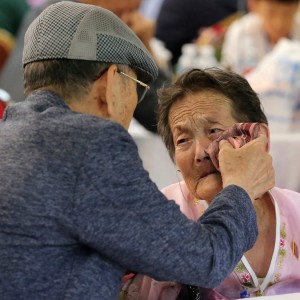
Friday Aug 07, 2020
Divided Families: Soojin Park, Paul Lee, Ambassador Robert King
Friday Aug 07, 2020
Friday Aug 07, 2020
You’ve probably heard the Korean War referred to as an unfinished conflict - but that’s not just a reference to the frozen war on the Peninsula. The sudden outbreak of war in 1950 and the rapid movement of the battlefront up and down the peninsula left countless people separated from their family members. Children separated from their parents - siblings losing one another in the chaos.
The scale of this tragedy was so immense that reunions efforts by South Koreans to reunite with relatives within South Korea would be ongoing well into the 1980s. Of course, reuniting family members separated by the demilitarized zone between the Koreas proved more challenging - arguably increasingly so in the past two decades. Will there ever be closure for these last victims of the Korean War?
Our guests today - Woodrow Wilson Center’s Soojin Park and Paul Lee from the U.S. Institute of Peace are intimately familiar with efforts by both governments and non-governmental organizations to reunite divided families. They are joined by Korea Economic Institute’s non-resident fellow and former special envoy for North Korea human rights issues.
You can find the issues brief on divided families that Paul Lee drafted for the National Committee on North Korea here:
https://www.ncnk.org/resources/briefing-papers/all-briefing-papers/u.s.-north-korea-divided-families
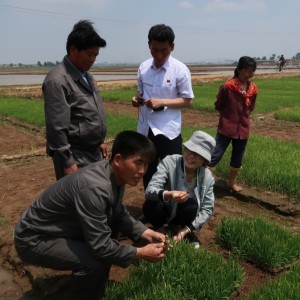
Friday Jul 31, 2020
The Ethics of Sanctions on North Korea: Hazel Smith
Friday Jul 31, 2020
Friday Jul 31, 2020
We often talk about whether the sanctions against North Korea are working. And we have spoken occasionally on this very podcast about the ways North Korea also cheats and gets around sanctions.
But less frequently discussed at KEI or elsewhere in policymaking circles is whether it is ethical to impose the sanctions that we have on North Korea currently.
To discuss this issue, we have with us today Dr. Hazel Smith, a professorial research associate in Korean studies at the School of Oriental and African Studies and Professor Emerita of International Security at Cranfield University.
KEI Vice President Mark Tokola caught up with her for a discussion on this very important subject.
You can read more on Dr. Hazel Smith's research in an article recently published on the Pacific Forum. Link to the article here: https://pacforum.org/publication/pacnet-24-the-destruction-of-north-korean-agriculture-we-need-to-rethink-un-sanctions
Also, Hope to see you on Wednesday, August 5, for a joint webinar event with the Korea Institute for International Economic Policy on how we should think about global value chains in the context of COVID-19 and U.S.-China trade war. It will be an important discussion that charts where international trade might be headed in the coming years.
RSVP here: https://share.hsforms.com/1NSpkIoKAQtyf6qjAi9wzEQ2ztzy
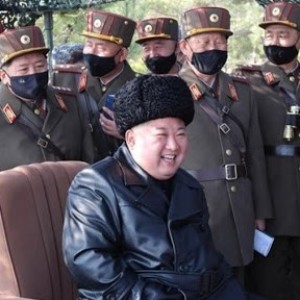
Friday Jul 24, 2020
How North Korea Responds to a Black Swan Event: Markus Garlauskas
Friday Jul 24, 2020
Friday Jul 24, 2020
North Korea is putting on a tough face as the world confronts the COVID-19 pandemic. Authorities in Pyongyang continue to reassure the rest of the world that nothing is wrong and that the country remains completely immune from the pandemic. And yet previous international crises - like the global rice panic of 2008 - had an outsized impact on North Korea because the country stands so precariously on the edge of economic collapse. Similarly, the country’s decision to close its borders to both goods and people in response to the pandemic is expected to have severe consequences on the livelihood of many people.
Simultaneously, the country has also been maintaining diplomatic isolation - waving away overtures from South Korea and demolishing the inter-Korean liaison office that had symbolized the great advances made since the summits between Moon Jae-in and Kim Jong-un in 2018.
But now, Pyongyang faces a tough decision - will it maintain this isolation even as South Korean voters extend overwhelming support to its pro-engagement administration, and as the United States prepares for an election where Donald Trump - the U.S. president who has extended legitimacy to the North Korean leadership - faces a very tough competition?
To discuss Pyongyang’s strategic choices at this critical juncture, we have with us today, Markus Garlauskas - a former U.S. National Intelligence Officer for North Korea. KEI Senior Director Troy Stangarone caught up with him for a quick discussion.
Staying on the subject of North Korea, KEI will host Dr. Hazel Smith on July 28, 2020 at 2 p.m. EDT for a discussion on the ethics of international sanctions on North Korea - she asks whether the illegality of North Korea’s nuclear arsenal justifies the current pressures placed on the country by the international community.
You can RSVP for the event here:
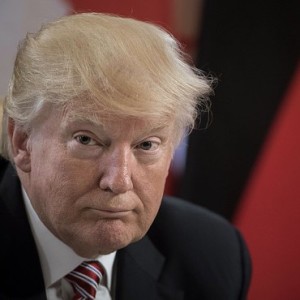
Friday Jul 17, 2020
The Retreat (And Return?) of the United States: Gordon Flake
Friday Jul 17, 2020
Friday Jul 17, 2020
Since Donald Trump took over as president in 2017, the United States has been retreating from the world - and from the Indo-Pacific region more specifically. Most notably, the country has backed out from the Trans-Pacific Partnership, the nuclear agreement with Iran, and the Paris Climate Agreement.
How do countries in the Indo-Pacific region see the diminishing role of the United States on the global and regional stage?
Korea Economic Institute Senior Director Troy Stangarone spoke with Professor Gordon Flake on the views from Australia - one of America’s closest and oldest allies in the Western Pacific. He explains why the Trump administration’s isolation has been particularly concerning to Australia and what roles middle powers like Australia and South Korea have taken up at this time.
We have an exciting upcoming event at KEI next week - Former National Intelligence Officer for North Korea Markus Garlauskas will join us for a conversation on how COVID-19 has become a factor in North Korea’s engagement with the United States - and what the impending U.S. presidential election means for negotiations going forward.
You will find the RSVP here: https://share.hsforms.com/1a-RlfE_oQLuohzb5rvfcow2ztzy
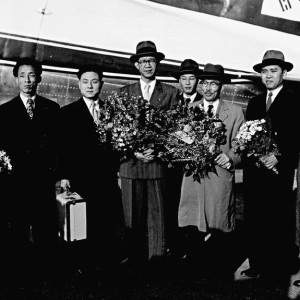
Friday Jul 10, 2020
When Cold Warriors Sued for Peace: Mark Tokola
Friday Jul 10, 2020
Friday Jul 10, 2020
Looking back on the Korean War, one might assume that the outbreak of a violent conflict that killed millions of people would preclude the possibility of a peaceful resolution of the division on the peninsula. Surprisingly, however, there was an effort in 1954 - only a year after the armistice that halted military engagements in Korea - to resolve the Korea question through diplomacy.
It’s not a secret that this conference failed to resolve the issues - but it was nonetheless historic. And while the international environment has changed drastically since, the lessons that the meeting offers to summit goers today is critical.
Our guest today is KEI Vice President Mark Tokola, who has done extensive research into this event using declassified state department documents.
If you are interested in reading up more about this event, you can find Mark Tokola’s full research paper here: http://www.theasanforum.org/9324-2/
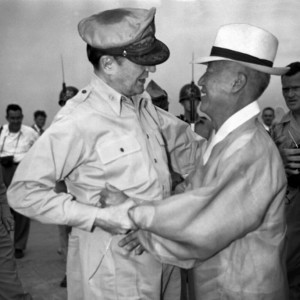
Friday Jul 03, 2020
Lasting Legacies of An Unfinished War: James Person and William Stueck
Friday Jul 03, 2020
Friday Jul 03, 2020
It would not be an exaggeration to claim that the Korean War shaped world history. There had been bloodshed elsewhere that bookmarked the start of the bitter conflict between the United States and the Soviet Union that would rage until 1991 - but it was Korea where the conflict was most pronounced.
But this pivotal event - as we observe it today in retrospect is also often deeply flawed.
We assume that the Korean War left the United States and South Korea closer together - military allies that would go on to fight together in Vietnam and the Middle East. And we assume that North Korea was determined to try their luck at a military invasion of South Korea again. History could not be further from the truth - the early years of the U.S.-Korea alliance were tenuous - one that was not expected to last too long - and the North Korean regime focused on developing its economy to garner legitimacy vis-a-vis their rival state in Seoul.
Discussing this and more, we have Professors James Person and William Stueck.
Just as a quick heads up, we have a really exciting event next week with Dr. Gordon Flake on what it means for Australia and South Korea to attend the G7 summit and what roles they might play in the geopolitical tension between China and the United States.
RSVP Here: https://share.hsforms.com/1xwC-DeCIRJ2JlQWXaum_wA2ztzy
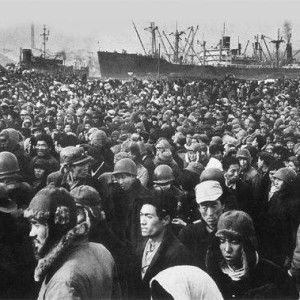
Friday Jun 26, 2020
The Miracle at Hungnam: Ned Forney
Friday Jun 26, 2020
Friday Jun 26, 2020
The international force that answered the United Nation's call to defend the Republic of Korea between 1950 and 1953 did more than engage in combat with North Korean and Chinese soldiers. In December 1950, American troops at the port city of Hungnam rescued 100,000 Korean refugees - even as they faced enemy fire and a bitter Korean winter.
One of the officers who were critical to what would be known as the “Hungnam Evacuation” was Colonel Edward Forney. In 2017, Colonel Forney's grandson, Ned Forney, was invited to Washington, DC to take part in a ceremony at the National Marine Corps Museum's new memorial for those who undertook rearguard action to buy time and space for the evacuation. Korean Kontext’s then-host Jenna Gibson had an opportunity to sit down with him for a conversation about Colonel Edward Forney and how South Korea’s current president, Moon Jae-in, is personally tied to this story.
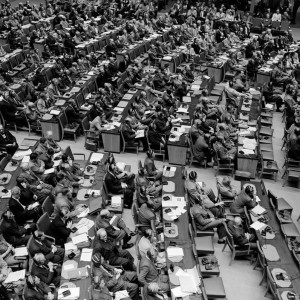
Friday Jun 19, 2020
A Division No One Planned or Wanted: Charles Kraus
Friday Jun 19, 2020
Friday Jun 19, 2020
June 25, 2020 marks the 70th anniversary of the start of the Korean War. The conflict on the Korean Peninsula has been going on for so long that we sometimes see it as a natural extension of the Second World War - But we forget that the tragic division was one that no one had planned or wanted.
So how did the Koreas end up becoming two countries if neither the United States or the Soviet Union had wanted this to happen?
To take us back to those fateful early years of the Cold War, we caught up with historian Charles Kraus. He is the deputy director of the History and Public Policy Programs at the Woodrow Wilson International Center for Scholars. The Wilson Center’s digital archives recently curated a series of declassified documents from the Soviet Union that reveal what the country’s chief policymakers, including Stalin, expected on the Korean Peninsula at the end of the Second World War. These documents weave a complex story of missed opportunities and misaligned intentions that ultimately yielded a tragedy.
Please consider visiting the Wilson Center’s digital archives: https://digitalarchive.wilsoncenter.org/
And here are some articles by Charles Krause:
"Failed Diplomacy: Soviet-American Relations and the Division of Korea" (https://www.wilsoncenter.org/blog-post/failed-diplomacy-soviet-american-relations-and-division-korea)
"Preparing for War: Soviet-North Korean Relations, 1947-1950" (https://www.wilsoncenter.org/blog-post/preparing-war-soviet-north-korean-relations-1947-1950)
"China, North Korea, and the Origins of the Korean War" (https://www.wilsoncenter.org/blog-post/china-north-korea-and-origins-korean-war)
And please check out the just-published issue of the Wilson Quarterly, which focuses on the Korean War. You can find a link to the issue, again, in the description of this episode. https://www.wilsonquarterly.com/quarterly/korea-70-years-on/
On Wednesday June 24, KEI is hosting Cold War scholars James Person and William Stueck for a historical perspective on how the Korean War shaped the geopolitical tensions in Asia and how they continue to affect the current security environment in the region. Please RSVP here: https://share.hsforms.com/1D6rEUgx6QqOGAMwq5rOMfQ2ztzy
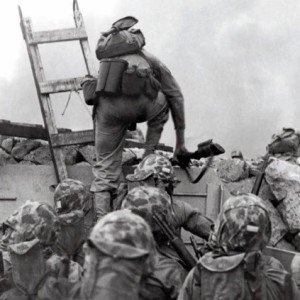
Friday Jun 12, 2020
Defending Korea and a Letter to Pvt. Parker: John Stevens
Friday Jun 12, 2020
Friday Jun 12, 2020
On June 25, 1950, North Korea launched a surprise invasion against South Korea and started a war that has not yet been formally ended.
It was almost a short war.
The North Korean invasion force consisted of more than a hundred Soviet tanks and an air force – all armaments that had devastated the German army on the eastern front during the Second World War only 5 years previously. By contrast, the South Korean army had no tanks and an air force composed solely of reconnaissance planes.
Predictably, South Korea’s capital Seoul fell in three days. And by August, the North Korean forces had nearly reached the southern port city of Busan – the last pocket of territory held by the Republic of Korea. And had it not been for the intervention of the United Nations forces, South Korea as we know it would not exist.
This episode is a rebroadcast of an interview with Colonel John Stevens, a veteran of the Korean War who fought at the Battle of the Nakdong River to defend that last pocket of South Korean resistance around the port of Busan. He also participated in the amphibious landing at Inchon that turned the tide of the war.
Colonel Stevens is also a veteran of World War 2. You can read more about his incredible military career in this article: https://nedforney.com/index.php/2018/09/28/john-stevens-marine-wwii-korean-war/
Also, stay tuned after the interview for a letter from Ambassador Kathleen Stevens.
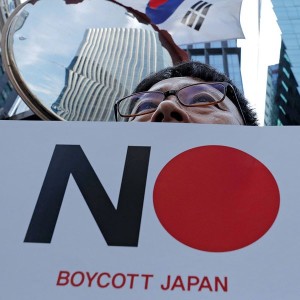
Friday Jun 05, 2020
Troubles Apologies in the Time of Pandemic: Alexis Dudden
Friday Jun 05, 2020
Friday Jun 05, 2020
The pandemic has been going on for so long that international affairs observers nearly forgot that two of America’s closest allies in one of the most consequential regions in the world have been locked in a bitter dispute since 2018.
South Korea believes that its citizens who were victims of forced labor under Japanese occupation between 1910 and 1945 have the right to pursue legal cases against private companies that exploited their bodies. Japan believes that they do not have such rights. And both countries have been exchanging barbs that did not fully dissipate with the outbreak of COVID-19.
Indeed, things might actually get worse in the coming months. On June 1, South Korean courts secured legal grounds to liquidate assets of Japanese steelmaker Nippon Steel that are held in South Korea - and use them to compensate forced labor victims. The seized assets are not a lot of money for a conglomerate like Nippon Steel - approximately USD 330,000. But what is on the line is not money, but historical narrative.
Our guest today is University of Connecticut Professor Alexis Dudden who is the author of the fantastic book on this very subject titled “Troubled Apologies Among Japan, Korea, and the United States.” She joins KEI Vice President Mark Tokola for a timely conversation that highlights how these tensions are rising at a particularly bad moment in international relations - and why controversies over history between Korea and Japan are so difficult to address in the context of the respective countries’ domestic politics.
You can find Dr. Dudden's book here: http://cup.columbia.edu/book/troubled-apologies-among-japan-korea-and-the-united-states/9780231141765
And you can sign up for KEI's weekly newsletter here: https://share.hsforms.com/1WiX_to9IRh-DlnV68MV0sg2ztzy
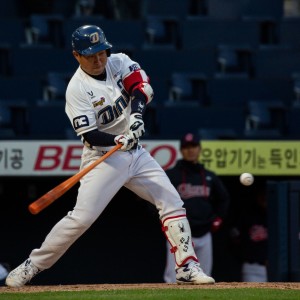
Friday May 29, 2020
Friday May 29, 2020
While the rest of the world is still struggling to contain the outbreak of COVID-19, South Korea - progressing steadily in its containment of the pandemic - has begun its season of baseball. With the Major League Baseball season postponed in the United States, ESPN has begun airing the Korean Baseball Organization’s games in America.
It is a seminal moment. Koreans are bringing baseball back to its homeland and showcasing what their league looks like. Potentially a harbinger for greater exchange of players between the two nations.
In light of this development, we have today a panel of Korean baseball experts, including former player Eric Hacker and agent Esther Lee, to discuss and highlight the 101 of the league and the sport in Korea. Our guest host, former U.S. ambassador to Korea Mark Lippert, moderates this discussion.
You can also find Troy Stangarone’s Diplomat column on the Korean Baseball Organization here: https://thediplomat.com/2019/06/should-amateur-baseball-players-go-pro-in-south-korea-and-japan/
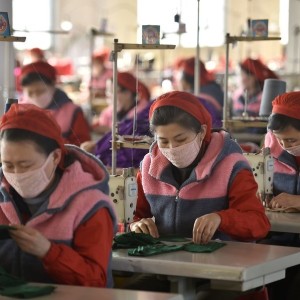
Friday May 22, 2020
The Last Transition Economy: Vincent Koen
Friday May 22, 2020
Friday May 22, 2020
Even in some fantastical scenario where Kim Jong-un suddenly decides to give up nuclear weapons and end his regime’s flagrant disregard for human rights, the Democratic People’s Republic of Korea will still be an impoverished state where less than half the country’s population has access to electricity.
How will North Korea climb out of this state of destitution? Identifying the challenges that the country faces is a vital first step. And that is precisely what a new report from the Organization for Economic Cooperation and Development does. This first stand-alone report on North Korea from the OECD takes stock of what is holding back the country today and provides guidelines on what might be needed to turn the country onto a path to prosperity.
Randall Jones, a Non-Resident Fellow at the Korea Economic Institute, a Visiting Fellow at Columbia University, and formerly the head of the Japan/Korea Desk at the OECD sat down with Vincent Koen, the head of the division of country studies at the OECD to discuss this new report.
You can read the OECD report here: https://read.oecd-ilibrary.org/economics/north-korea-the-last-transition-economy_82dee315-en
Also report on North Korea’s special economic zones that Vincent mentioned in the episode: http://www.keia.org/sites/default/files/publications/kei_aps_clement_190604_final.pdf
And an interview with the author of the report on the special economic zones here: https://www.podbean.com/media/share/pb-hrrpz-b495f4
Finally, you can find the RSVP for the May 26 webinar discussion with Dr. Alexis Dudden on what lies ahead for Korea-Japan relations here: https://share.hsforms.com/1je0Ns2CoRG2MJZZLbsm5ug2ztzy
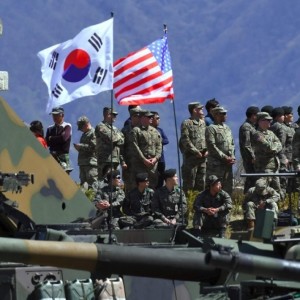
Friday May 15, 2020
Diplomacy or Readiness: Terence Roehrig
Friday May 15, 2020
Friday May 15, 2020
International observers were shocked when President Trump met with North Korea’s Supreme Leader Kim Jong-un in June 2018. But amid the spectacle of these two leaders putting aside their infamous barbs and insults, there was another shock awaiting the public. President Trump announced that joint military exercises with South Korea would be postponed on account of their costliness and their unnecessarily provocative nature. This had not been consulted with South Korea beforehand.
That was 2018 when people thought perhaps a peace treaty with North Korea was just around the corner. Two years on, there is no treaty, North Korea has not budged on its nuclear weapons arsenal, and in fact Pyongyang is beginning to act more provocatively. And yet, the old joint military exercises between South Korea and the United States have not resumed.
Would the forces be ready in case there is a conflict? This is the question that our guest, Professor Terence Roehrig seeks to answer today. He is a professor of National Security Affairs at the U.S. Naval War College and recently authored a paper for KEI titled: “ROK-U.S. Exercises and Denuclearizing North Korea: Diplomacy or Readiness?” which you can find here: http://www.keia.org/sites/default/files/publications/kei_aps_2020_roehrig_200422.pdf
The episode today is from a web discussion between Professor Roehrig and KEI’s Director of Academic Affairs Kyle Ferrier.
You can also RSVP for our upcoming discussion with Andray Abrahamian on Tuesday, May 19 on how we might be able to better understand developments in North Korea here: https://share.hsforms.com/1NMB8QG0YSS-TpoEnz6d0FQ2ztzy
And RSVP for the panel discussion on Thursday, May 21 featuring former U.S. ambassador to Seoul Mark Lippert on the implications of ESPN broadcasting Korean baseball in the United States here: https://share.hsforms.com/13tmr1-R2Qtiz3XFvIcm1cg2ztzy
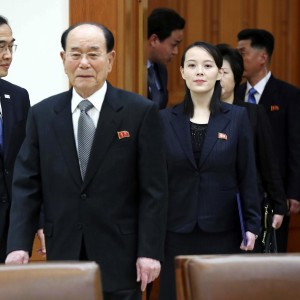
Friday May 08, 2020
Succession in North Korea: Ken Gause, Chris Steinitz
Friday May 08, 2020
Friday May 08, 2020
After weeks of keeping the international community spellbound with his sudden disappearance and rumors of his death, Kim Jong-un has reemerged in public. But this whole event raised a very important question in people’s minds. Who would succeed North Korea’s supreme leader if he were to die?
It’s clear to even people without medical degrees that Kim Jong-un is not the healthiest bloke on the international stage - a heart attack would not be out of the question. What would happen to North Korea then? Who would command the country’s one-million strong military and nuclear arsenal?
Our guests today, Ken Gause and Chris Steinitz from the Adversary Analytics Program at CNA, outline potential outcomes.
As a quick caveat, the discussion was recorded before news emerged of Kim Jong-un’s public appearance, but the question of what might happen if the North Korean leader were to be suddenly incapacitated is still important to consider now more than ever.
You can find Ken and Chris' article here: http://blog.keia.org/2020/04/post-kim-jong-un-regime/
Please also consider RSVPing for our event on May 12 with former US Forces Korea Commander Walter Skip Sharp: https://share.hsforms.com/1H3P0Pa_BRpeosIKM_-jSHQ2ztzy
And our event on May 13 with researchers from the Organization for Economic Cooperation and Development on the current state of the North Korean economy: https://share.hsforms.com/1Ypu6JeeoTbui-FSoO26Ahw2ztzy

Friday May 01, 2020
Two Disappearances and a Funeral: Mark Tokola
Friday May 01, 2020
Friday May 01, 2020
Where in the world is Kim Jong-un? The dictator of North Korea who appears so fond of being filmed and photographed has disappeared from sight - and there are rumors that he is possibly dead. Social media, in particular, has turned the event into a meme, adding cultural references such as Game of Thrones to frame imaginary scenarios on what might follow in the vacuum left by the late supreme leader.
But for those who have been watching North Korea for a while, this is not a new occurrence. Leaders of this most opaque state have disappeared in the past. Our guest today, KEI Vice President Mark Tokola - a veteran of the US foreign service and former Deputy Chief of Mission at the U.S. embassy in Seoul - remembers those incidents. And with history as an added guide, he provides a more sober analysis of the ongoing mystery around the whereabouts of Kim Jong-un.
You can find Mark Tokola's article on this topic here: http://blog.keia.org/2020/04/kim-regimes-two-disappearances-funeral/
In addition, please find the RSVP for our discussion with Col. David Maxwell on potential instability in North Korea: https://share.hsforms.com/1sq5iU-1HSBuh9vCm4hpX_A2ztzy
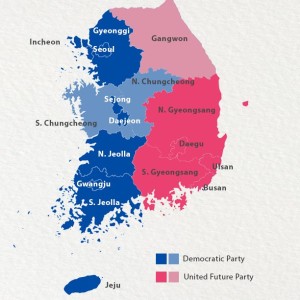
Friday Apr 24, 2020
Friday Apr 24, 2020
On April 7, the American state of Wisconsin held an election to decide who would be the Democratic Party’s nominee for the US presidential election in November 2020. The days leading up to the election were chaotic with the state’s Democratic governor calling for a postponement of the state-wide election out of public health concerns and the state’s Republican-controlled legislature challenging this order. Ultimately, the election went ahead - and health officials note that, to date, at least 19 people infected with COVID-19 in the state of Wisconsin can trace their exposure to the election.
The following week, on April 15, a very differently-run election took place in South Korea. All 300 seats in South Korea’s unicameral legislature were up for grabs and South Koreans went to the polls in greater numbers than they had since 1992 to elect a new National Assembly.
Meticulous plans had been made, including measures to ensure that voters would be able to maintain social distancing at polling stations; that voting booths would be regularly wiped down, and that self-quarantined citizens would be able to vote after polling stations were closed to regular voters.
Perhaps equally impressive was the outcome - a landslide victory for President Moon Jae-in’s Democratic Party - which now controls 180 seats in parliament, a full three-fifth of the chamber.
In this episode, Former National Assemblyman Song Hochang, Chosun Ilbo Deputy Editor Kang Insun, and Scott Snyder discuss both how South Koreans held the election and what the political impact of the results would be for the incumbent Moon Jae-in administration.
This episode is an excerpt from a public webinar on April 16. You can watch the full event on KEI's YouTube channel here: https://youtu.be/5_8WpGnpnkU
You can also RSVP to KEI's webinar on April 30 on the impact of COVID-19 in North Korea here: https://share.hsforms.com/5031070/5ea46576-d84a-4e39-8f71-888679fd9c3f
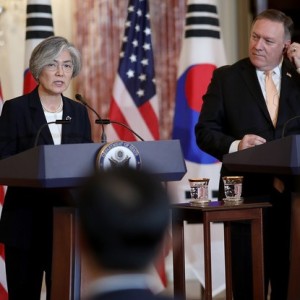
Friday Apr 17, 2020
Going Together to Address a Pandemic: Marc Knapper
Friday Apr 17, 2020
Friday Apr 17, 2020
Few alliances in the world are as storied and robust as the U.S.-Korea alliance. Building on the security relationship established at the end of the Korean War, the partnership between the two countries have since expanded to trade, science and technology, human rights, and elsewhere.
And in particular, we saw the public health cooperation between the two countries in the joint effort to contain and treat Ebola during the 2014 outbreak in West Africa.
So what has the partnership looked like between the two countries in the ongoing effort to contain COVID-19?
To discuss this collaboration, our guest today is the Deputy Assistant Secretary of State for Korea and Japan Marc Knapper. A member of the Senior Foreign Service of the U.S. Department of State, his previous postings have included Tokyo, Hanoi, and Baghdad - but most notably for the discussion today, he served as the Chargé d’Affaires at the U.S. embassy in Seoul from 2017 to 2018 and Deputy Chief of Mission from 2015 to 2016.
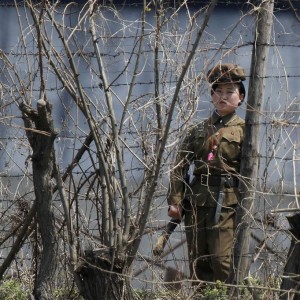
Friday Apr 10, 2020
Friday Apr 10, 2020
Should the international community suspend advocacy for human rights in favor of cooperation with odious regimes to fight the COVID-19 pandemic?
This appears upon first glance like a trade-off, but Ambassador Robert King and Greg Scarlatoiu make the case that they are not - in fact, robust human rights is fundamental to containing an infectious disease. They focus in particular on North Korea, whose human rights abuses are actually what makes the country more susceptible to COVID-19 than other countries.
This podcast is an excerpt from a webinar event on human rights in North Korea, which you can find here: https://youtu.be/Tq_5r9a-68I
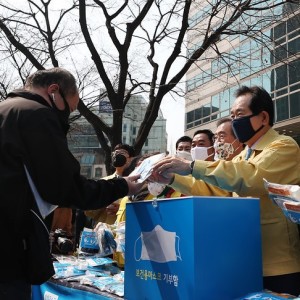
Friday Apr 03, 2020
The Economic Fallout of a Pandemic: Troy Stangarone and Kyle Ferrier
Friday Apr 03, 2020
Friday Apr 03, 2020
We are amidst a pandemic - its victims will not only be the sick but also those who will lose their livelihood as the economy shuts down to contain the further spread of the disease. A body of research, including those published in the Journal of Health and Social Behavior, notes that after old age and pre-existing health conditions, low socioeconomic status acts as the top variable that could determine your susceptibility to epidemics. In the context of COVID-19, available data suggest that COVID-19 can be about twice as deadly for those in society’s lower rungs.
At this critical moment, governments around the world are struggling to find ways to ensure both economic security and safety.
Our guests today, KEI Senior Director Troy Stangarone and Director Kyle Ferrier, are tracking how South Korea is confronting this challenge. For policymakers and leaders of corporations in the United States, Seoul’s economic response - alongside those of European states - are sure to have some relevant policy lessons for their own response.
You can find Troy and Kyle’s recent articles on South Korea’s response to the economic fallout of the pandemic here:
http://www.koreatimes.co.kr/www/nation/2020/03/738_286766.html
https://thediplomat.com/2020/03/south-korea-braces-for-global-recession/
https://thediplomat.com/2020/02/coronavirus-now-poised-for-outsized-impact-in-south-korea/
http://blog.keia.org/2020/03/south-korea-covid-19-financial-crisis-part-2-tools-cooperation/
Please also consider watching our recent event video on the state of human rights in North Korea. Ambassador Robert King and Committee for Human Rights in North Korea executive director Greg Scarlatoiu note how human rights violations in the country - like mass detention and information repression - will compromise public health in the face of COVID-19.
You can find the event video here:
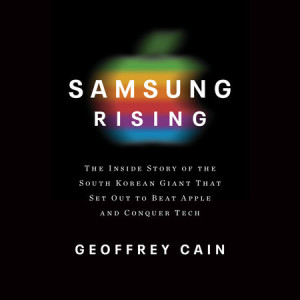
Friday Mar 27, 2020
The Rise, Stumble, and Rise of A Conglomerate: Geoffrey Cain
Friday Mar 27, 2020
Friday Mar 27, 2020
How does a company that began as a vegetable and fish shop grow to become a leading global tech company - what made that astonishing growth possible, and what are some of the unseen costs of that blinding development? Perhaps just as importantly for American audiences, what are the implications of such a company on the society that it inhabits?
To discuss this and much more, we are joined by Geoffrey Cain, a longtime journalist whose work has appeared in The Economist, Time and The Wall Street Journal. Geoffrey is also a regular commentator on Bloomberg TV, BBC, CNN, and NPR.
His newest book Samsung Rising - published by Currency, an imprint of Random House - tracks the rise of Korea’s leading brand name from the time of Korea’s colonial occupation in the 1930s to its aggressive rise to become the largest smartphone maker in the world.
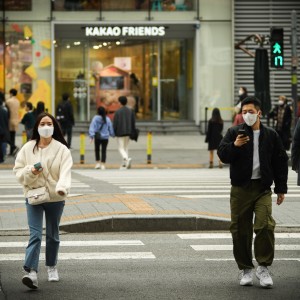
Friday Mar 20, 2020
Friday Mar 20, 2020
On January 27, the South Korean government in concert with private biotech companies went into overdrive to produce effective testing kits for the coronavirus. There were at the time 4 cases in the country, but the gravity of the crisis was quickly understood. 7 weeks later, South Korea had tested well over 290,000 people and identified over 8,000 cases. As a result, there has been a reduction in new cases in March.
South Korea’s actions contrast from those of the United States government - only 60,000 tests have been run as of March 18 - there are 330 million people in the country. As a result of these insufficient tests, there is no way of knowing how many cases are in the United States. And an effective containment policy is difficult to craft. One projection estimated that 96 million people in the United States could be infected in the coming months.
Why was there such a huge difference between the governments’ responses in South Korea and the United States? And what can the world do together to address this crisis?
KEI President Ambassador Kathleen Stephens and Vice President Mark Tokola highlight that it was not just technical capacity but political leadership and civic engagement that played a huge role in shaping South Korea’s response.
You can also find KEI Senior Director Troy Stangarone’s recent piece in The Diplomat magazine on South Korea’s preparations for the economic challenges that are expected to stem from the global pandemic, here: https://thediplomat.com/2020/03/south-korea-braces-for-global-recession/
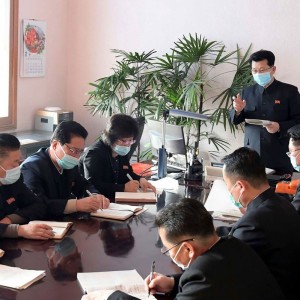
Friday Mar 13, 2020
How an Isolated Country Fights a Pandemic: Troy Stangarone
Friday Mar 13, 2020
Friday Mar 13, 2020
On Friday, March 13, Commander of United States Forces Korea General Robert Abrams noted that North Korea’s armed forces have been in lockdown for about 30 days and only recently have started routine training again. Citing one example, General Abrams highlighted that the North Korean airforce did not fly an airplane for 24 days. He believes this is a sign that the country is trying to deal with the coronavirus outbreak.
Meanwhile, Kim Jong-un was featured in North Korea’s state media supervising live-fire artillery exercise. The country has also launched short-ranged projectiles.
What is going on? Why would North Korea choose to look more aggressive at a time when it could most benefit from international cooperation? KEI Senior Director and Fellow Troy Stangarone joins us to answer this question.
You can find a link to Troy’s article for the Diplomat magazine here: https://thediplomat.com/2020/03/coronavirus-the-economic-costs-for-north-korea/
Please also listen to our previous episodes on how the Korean Peninsula is addressing the coronavirus outbreak.
With KEI Fellow Kyle Ferrier on South Korea's response: http://keia.org/podcast/tackling-coronavirus-not-costless-kyle-ferrier
And with Dr. John Grundy on the preparedness of the North Korean healthcare system: http://keia.org/podcast/can-north-korea-take-coronavrius-not-alone-john-grundy
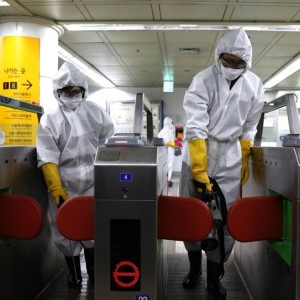
Friday Mar 06, 2020
Tackling the Coronavirus is Not Costless: Kyle Ferrier
Friday Mar 06, 2020
Friday Mar 06, 2020
As of March 6, there are over 6,500 reported coronavirus cases in South Korea.
It is currently the country with the second-largest number of coronavirus patients.
The large number, however, may be less a reflection of South Korea’s exposure to the disease and more of the country’s proactive effort to screen and test people for the viral infection. The country has tested over 140,000 people - setting up stations throughout the country and employing all public resources, including its universal health care system and the military, to establish the infrastructure needed to treat patients.
The thoroughness of the country’s approach to the coronavirus is evident in its fatality rate standing at 0.57% - this is far lower than the 3.4% figure cited by the World Health Organization and it reflects either South Korea’s ability to detect patients more quickly and more thoroughly or its ability to treat patients more effectively.
Nonetheless, the disease has been a major strain on South Korea socially, economically, and politically. KEI Fellow and Director of Academic Affairs Kyle Ferrier walks us through how the coronavrius is affecting the country.
You can find Kyle Ferrier’s recent pieces for the Diplomat Magazine in the following links:
https://thediplomat.com/2020/02/coronavirus-concerns-intensify-in-south-korea/
https://thediplomat.com/2020/02/coronavirus-now-poised-for-outsized-impact-in-south-korea/
If you have not checked out our interview from last week with Dr. John Grundy on how North Korea might be addressing the coronavirus outbreak, we highly recommend you take a listen: http://keia.org/podcast/can-north-korea-take-coronavrius-not-alone-john-grundy

Thursday Feb 27, 2020
Can North Korea take on the coronavrius? Not alone: John Grundy
Thursday Feb 27, 2020
Thursday Feb 27, 2020
The U.S. Center for Disease Control announced this week that Americans should prepare for the coronavirus spreading in the United States. And in other parts of the world, the disease is already spreading quite rapidly.
At this time, many security analysts are waking up to the reality that there are countries less prepared to contain and treat this new infectious disease - these countries may become a weak link in the global chain to stem the spread of the disease and intensify the consequences of a pandemic.
In Northeast Asia, that country is North Korea - for its part Pyongyang is taking this disease seriously. Its response has been stronger than it had been against the 2014 ebola outbreak, the H1N1 outbreak in 2009, and the SARS outbreak in 2002-2003. It has been described by some analysts as “unusually high-profile."
So what might be aiding or detracting North Korea’s capacity to address this major threat? Our guest today, Dr. John Grundy, is a medical professional who has traveled to North Korea over 8 times and has visited remote locations to examine the country’s health systems. He joins us today to provide his take on North Korea’s public health capacity.
You can find Dr. Grundy’s 2015 paper covering the evolution of North Korea’s public healthcare system from the Cold War era to today, here:
Please also check out a rebroadcast of KEI's 2017 interview with Dr. Grundy on the history of North Korea's healthcare system:
![[Rebroadcast] North Korea's Healthcare System: John Grundy](https://pbcdn1.podbean.com/imglogo/ep-logo/pbblog284530/kju-hospital-visit2-935x500_300x300.png)
Friday Feb 21, 2020
[Rebroadcast] North Korea's Healthcare System: John Grundy
Friday Feb 21, 2020
Friday Feb 21, 2020
Even before the coronavirus became the top headline news in the United States, North Korea responded to the outbreak of the infectious disease in China by sealing its borders. North Korea has not yet reported any cases of the coronavirus - but five North Koreans reportedly died on the Sino-North Korean border from symptoms similar to the coronavirus - there are also reports that a North Korean in Pyongyang may have contracted the virus as well.
At this moment, how prepared is North Korea’s healthcare system to combat this new infectious disease? We bring you an episode of the Korean Kontext from 2017 where we sat down with Dr. John Grundy who has field experience examining North Korea’s medical facilities - and had written a paper for KEI on the history of the country’s healthcare system.
You can find Dr. Grundy’s 2017 paper for KEI, "History, International Relations, and Public Health: The Case of the Democratic People's Republic of Korea, 1953-2015" here:
Please also find KEI Senior Director Troy Stangarone’s Peninsula Blog article on why the U.S. government should help North Korea combat the coronavirus here:
http://blog.keia.org/2020/02/united-states-can-help-north-korea-coronavirus/

